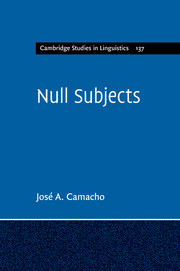1 - Introduction
Published online by Cambridge University Press: 05 April 2013
Summary
Variation and invariance in Generative Grammar
Perhaps one of the most revolutionary tenets that Generative Grammar assumed from its outset was the idea that all languages share common underlying grammatical features, a belief that helped address the puzzling way in which children learn languages. In particular, as Chomsky has repeatedly observed (see Chomsky, 1975, 1988, for example), children learn grammatical rules and patterns for which they have little, confusing and sometimes contradictory evidence (the so-called poverty of stimulus or Plato's problem). Furthermore, they do not assume certain grammatical rules that could be generalized from the available data. Chomsky has concluded from these observations that much of the grammatical knowledge we have must be innate, and that the grammars of languages are much closer to each other than it would seem at first sight. Both of these conclusions together suggest an explanation for why the acquisition process seems so effortless and on target: if children come with an innate predisposition for languages that contains fairly specific and delimited principles, then they can simply make sense of the linguistic input around them, guided by such innate principles. The tenet that languages are underlyingly close has led to important discoveries about similarities in apparently very different patterns across languages.
While languages may show surprisingly similar abstract patterns, we also observe obvious surface variation. For example, aspect plays a comparatively small role in the verbal morphology of English compared to the elaborate aspectual distinctions of the Russian paradigm.
- Type
- Chapter
- Information
- Null Subjects , pp. 1 - 10Publisher: Cambridge University PressPrint publication year: 2013



